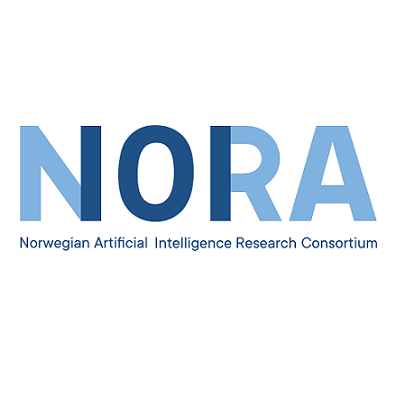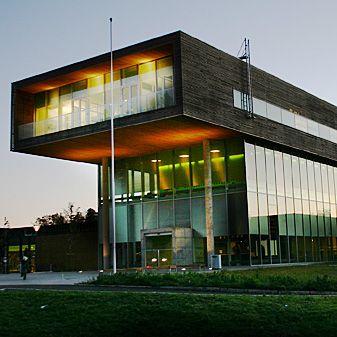Østfold University College brings together applied research, cross-disciplinary collaboration, and a strong commitment to societal relevance. Its work focuses on practical solutions to today’s key challenges – from sustainable healthcare and inclusive education to digital transformation.
The Norway Mobility Program offers data science talents the opportunity to spend up to three months at Østfold University College, where they engage in hands-on research and contribute to impactful, interdisciplinary projects at the intersection of technology, health, and society.

About NORA
NORA - Norwegian Artificial Intelligence Research Consortium
Østfold University College is a partner of NORA, the Norwegian Artificial Intelligence Research Consortium. This initiative aims to strengthen Norwegian research, education, and innovation in the fields of artificial intelligence, machine learning, and robotics, as well as other relevant areas that support the development of AI applications.
Together with HIDA, NORA co-organizes the Norway Mobility Program, which offers doctoral researchers and postdocs from the Helmholtz Association and NORA partner institutions the opportunity to participate in a research stay in Norway.
Østfold University College (HiØ) is dedicated to tackling pressing societal challenges through practical and innovative approaches. Key areas of focus include digital transformation, sustainable development, health and welfare, inclusive education, and the advancement of smart, resilient communities.
Research at HiØ is deeply rooted in collaboration—with partners across academia, industry, the public sector, and international networks. The aim is to turn knowledge into tangible outcomes that benefit society and drive meaningful change at both local and global levels.
Research priorities:
- Faculty of Health, Welfare and Organisation
- This faculty engages in interdisciplinary research across clinical nursing, biomedical technology, psychosocial work, digital health, person-centred care, welfare services, and educational methods—addressing contemporary challenges in healthcare, social work, and professional development through both practical and theoretical lens.
- Faculty of Computer Science, Engineering and Economics
- This faculty hosts diverse research groups spanning advanced materials, applied economics, green energy, machine learning, digital communication, cyber-physical systems, and innovative teaching—highlighting a strong interdisciplinary focus on technology, sustainability, and societal development.
- Faculty of Teacher Education and Languages
- This faculty conducts broad-ranging research in early childhood, mathematics and science education, language and literature, lifelong learning, special education, and artistic research, emphasizing critical, developmental, and digital perspectives on teaching and learning across the lifespan.
In 2023, HiØ reported about 7,079 students and 652 staff members, including both academic and administrative personnel

The sites
The sites
Østfold University College operates on two main campuses:
- Halden campus, located at Remmen in Halden
- Fredrikstad campus, situated on Kråkerøy in Fredrikstad
Fotocredit: Bård Halvorsen, Attribution, via Wikimedia Commons
Østfold University College's expertise in the field of Data Science and AI
At the Østfold University College, Data Science and AI are central pillars of interdisciplinary research and innovation.
- Machine Learning & Predictive Analytics
- The Machine Learning research group conducts both fundamental and applied investigations—from evolutionary computation and neuro‑AI to decision support in healthcare, optimization, and fake‑news detection.
- AI in Healthcare
- Projects include Decision Support in Health Care using AI, and Remote Intelligent Health Care Monitoring, leveraging clinical and sensor data for diagnostics, monitoring, and decision support.
- Explainable, Ethical & Trustworthy AI
- The Trustworthy AI Lab focuses on ethical assessments using the Z‑Inspection® methodology, hosting research collaborations, teaching modules, and real-world use‑case evaluations.
- AI in Education
- Research on Artificial Intelligence for assessment for learning (AI4afl)—applying AI to enhance learning and teaching—funded by national agencies.
- Text & Handwriting Recognition
- The Hugin‑Munin project uses AI-driven tools to digitize and analyze cultural heritage documents—both handwritten and printed.
- Complex Systems & Hybrid AI Models
- Ongoing projects include DeepCA (hybrid deep learning and cellular automata reservoirs) and work in evolutionary computation, swarm intelligence, and general neuro‑AI techniques.
- IoT, Cyber‑Physical Systems & Energy
- Applied research into smart infrastructure, including sustainable building control (DOITSMARTER), intelligent energy systems, and critical road‑safety applications (CRISP).
How to Apply
- Step 1: Contact a research group at one of the NORA member institutions to discuss the possibility of a three-month research stay.
- Step 2: Please submit your application via the following application portal.
- Step 3: Applications are reviewed by a selection committee, and you will be notified shortly thereafter.
More information about the program regulations can be found here!
Contact
If you have any further questions on this or our other mobility programs, please do not hesitate to contact us.

Stefanie Gruber-Sliva
Networks & Mobility Program Manager
Contact







